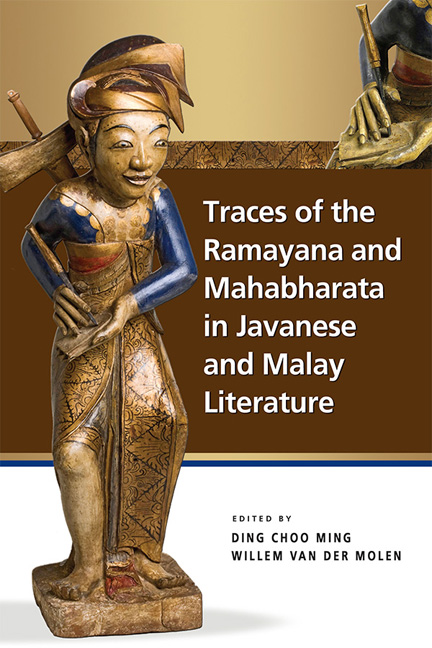Book contents
- Frontmatter
- Contents
- Abbreviations
- About the Contributors
- 1 Introduction
- 2 The Rāmāyaṇa in Java and Bali: Chapters from its Literary History
- 3 Abimanyu Gugur: The Death of Abimanyu in Classical and Modern Indonesian and Malay Literature
- 4 Drona's Betrayal and Bima's Brutality: Javanaiserie in Malay Culture
- 5 Ramayana and Mahabharata in Hikayat Misa Taman Jayeng Kusuma
- 6 The Death of Śalya: Balinese Textual and Iconographic Representations of the Kakawin Bhāratayuddha
- 7 The Illustrated Asṭabrata in Pakualaman Manuscript Art
- Index
- Nalanda-Sriwijaya Series
3 - Abimanyu Gugur: The Death of Abimanyu in Classical and Modern Indonesian and Malay Literature
Published online by Cambridge University Press: 04 July 2018
- Frontmatter
- Contents
- Abbreviations
- About the Contributors
- 1 Introduction
- 2 The Rāmāyaṇa in Java and Bali: Chapters from its Literary History
- 3 Abimanyu Gugur: The Death of Abimanyu in Classical and Modern Indonesian and Malay Literature
- 4 Drona's Betrayal and Bima's Brutality: Javanaiserie in Malay Culture
- 5 Ramayana and Mahabharata in Hikayat Misa Taman Jayeng Kusuma
- 6 The Death of Śalya: Balinese Textual and Iconographic Representations of the Kakawin Bhāratayuddha
- 7 The Illustrated Asṭabrata in Pakualaman Manuscript Art
- Index
- Nalanda-Sriwijaya Series
Summary
In Indian mythology, Abimanyu is the teenage son of Arjuna and Subadra. He has learned from his father how to break through the enemy line in battle but, unfortunately, not how to get out again. Abimanyu's tragic death is told in the Mahabharata (the “Adi Parwa” and the “Drona Parwa”), and was later retold in many vernacular versions from South and Southeast Asia — often with additional details, such as his marriage to Siti Sundari, which is absent from the Mahabharata and the Sanskrit tradition in general. This chapter will compare the accounts of his death in the Javanese Kakawin Bharatayuddha, the Malay Hikayat Pandawa Lima and the contemporary Indonesian short story “Nostalgia” by Danarto. The comparisons will describe the ways in which the story and the ideology framing the meaning of Abimanyu's death shift between these various accounts.
Keywords: Abimanyu; Mahabharata; Bharata Yuddha; Hikayat Pandawa Lima; Danarto.
Introduction
Abhimanyu replied: ‘I will fight for the victory of my fathers and pierce the splendid strategy of Drona.
My father Arjuna taught me the secret of penetrating this array but I do not know how to come out of it should an emergency arise.’
(Mahabharata VII: 35.18–19, trans. P. Lal 2007: 190)It has been said that there are many Ramayanas, both in India and abroad, and “each reflects the social location and ideology of those who have appropriated it” (Richman 1991, p. 4). The same is, of course, true of the Mahabharata. There are many Mahabharatas and its multiple stories are variously read, recited, acted, danced, sculptured, filmed, drawn, and possibly recreated in many other ways as well, all reflecting the values and aesthetics of the time and place in which they are recreated. Sutjipto's Indonesian translation of the Old Javanese Kakawin Bharatayuddha describes the story of fratricidal violence as “cerita yang mengerikan ini”, this horrifying story (Sutjipto Wirjosuparto 1968, p. 360). Few sections of the epic are as horrifying as the death in battle of Abimanyu, the young son of Arjuna and Subadra.
- Type
- Chapter
- Information
- Publisher: ISEAS–Yusof Ishak InstitutePrint publication year: 2018



